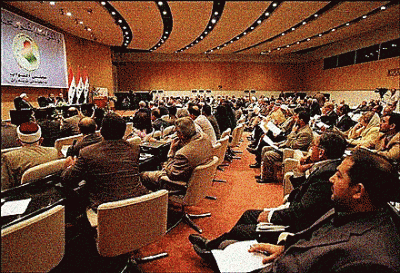 “In a late-night vote with little scrutiny, [the Iraqi] parliament last week approved spending $50 million on … armored cars out of the $100 billion Iraqi budget for 2012,” according to the Associated Press. With some quick math, I figured that if all 325 members of the Iraqi parliament halved their monthly salaries ($22,500, according to the AP) for a year and pooled the money together, they’d only be about $6 million short of being able to afford the cars without needing to increase to the budget. Perhaps halving their salaries would be seen as a goodwill gesture, even though the Wall Street Journal notes that most of the budget is fed by oil revenues.
“In a late-night vote with little scrutiny, [the Iraqi] parliament last week approved spending $50 million on … armored cars out of the $100 billion Iraqi budget for 2012,” according to the Associated Press. With some quick math, I figured that if all 325 members of the Iraqi parliament halved their monthly salaries ($22,500, according to the AP) for a year and pooled the money together, they’d only be about $6 million short of being able to afford the cars without needing to increase to the budget. Perhaps halving their salaries would be seen as a goodwill gesture, even though the Wall Street Journal notes that most of the budget is fed by oil revenues.
It probably won’t work, though. The 40 Sadrist legislators in the parliament wouldn’t likely participate in such an effort because Muqtada al-Sadr says that any legislator who buys an armored car is “a traitor for his nation and homeland, and moreover, disobedient to God.” Although in theory, 40 fewer members means 40 fewer cars, so I don’t think the calculations would change (if we assume that for $50 million, every member would have gotten their own car).
The AP report said nothing about the possibility of legislators carpooling, unfortunately.
Iraqi legislators certainly feel they need this protection given the fact that car bombings — blamed on “al Qaeda in Iraq” — continue to hit Iraqi cities, and the parliamentary building itself was bombed in 2007 (by a suicide bomber, though, not a vehicle bomb). At least five parliamentarians have been assassinated in office since the body formed, and more have been wounded by failed attempts on their lives. However, the way they’ve chosen to respond to the attacks — by voting themselves money to buy bullet-proof Mercedes — has upset many Iraqis, since there hundreds of people who can’t afford gated compounds, sniffer dog details or armored cars and pay a huge price for continued sectarian violence, which some Iraqis increasingly believe the government itself is complicit in, either through incompetence or worse.
And considering that at $22,500 a month, the average Iraqi parliamentarian would have a higher annual salary than the Speaker of the House in the U.S. Congress, it’s hard to disagree with the assessment of a Mr. Abdul-Wahab of Baghdad that the legislators are “addicted to privilege.”
Perhaps Washington could provide the cars, though, as a gesture of good faith to “reengage” with Baghdad? The Washington Post op-ed went to print urging the U.S. to reassert itself in Iraq by not reducing the number of staff in the U.S.’s bloated Baghdad Embassy and finding a way to redeploy U.S. soldiers to Iraq (some Members of Congress had hoped that we’d be able to keep at least 10,000 soldiers there; the Obama Administration did try to renegotiate the “status of forces” agreement with the Iraqis, though ultimately the White House followed through on the withdrawal schedule set by George W. Bush). “Iraq could be the linchpin of a new U.S. strategy for the Middle East at a time when one is desperately needed,” the authors write, evoking the moment in 2003 and 2004 when we were told that Ahmed Chalabi was a new George Washington.
If George Washington was ever investigated for corruption and providing false intelligence, that is. Matt Duss‘s pithy Twitter riposte to this editorial was simply “Former Chalabi boosters blame Obama for Iranian influence in Iraq.”
While from a neoconservative perspective the authors — who are both from the AEI, a strong booster for regime change in Iraq — make sense, as the neoconservative model for influence via occupation equals postwar South Korea and Japan, they’re advancing a losing argument. There is no political will in the U.S. to redeploy thousands of soldiers back to Iraq, and except for some Iraqi Army officers and parliamentarians, the Iraqis wanted the U.S. to adhere to the agreement. Moreover, there’s little leverage Washington could bring to bear against Baghdad, since the Bush-Maliki relationship was never a partnership: it was an occupation.
Essentially, the only way the U.S. would regain that leverage is if sectarian violence becomes much more widespread (say, a series of attacks precipitates the Sadrists or the Badr Organization or Sunni tribal militias in Anbar Province to quit the electoral process and return to fighting). Then an unequal relationship could be built in to the bilateral relationship — which would prove that 1) a permanent military presence is what the U.S. desires most and 2) Iraq has made little progress despite nine years of occupation. The latter would rather discredit the former, I feel, but as the National Interest pointed out last year, none of those who endorsed the occupation want to admit that “the United States has paid a terrible cost — some $850 billion and more than 4,400 dead American soldiers — to make Iran the most influential power in Iraq” (to say nothing of Iraqi lives lost).
An anonymous Iraqi quoted by WSJ put it best: “They told us in the last elections that our vote is gold. Where is the gold? My vote has become rust.”
Your vote, and the neoconservative Project for a New American Century both, though I imagine many Iraqis do not mourn the latter.
